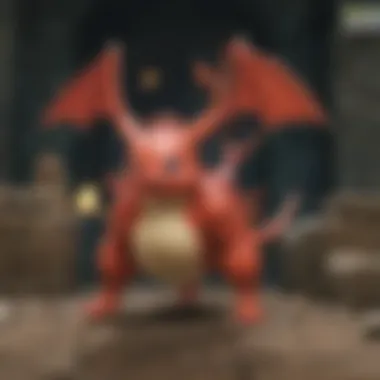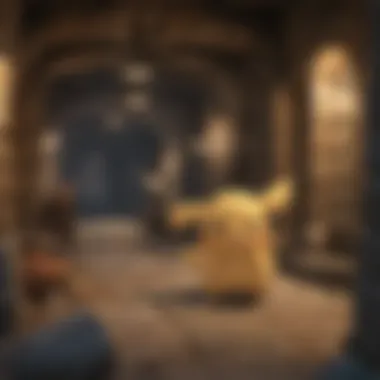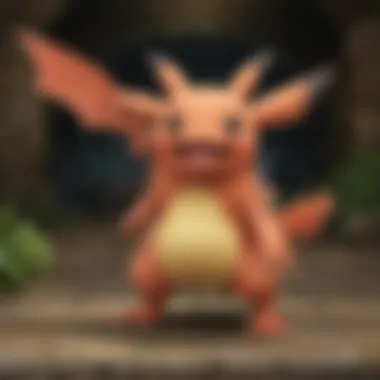Exploring Pokémon Dungeon on Switch: A Comprehensive Guide


Intro
The Pokémon franchise has long captivated audiences across generations. Since its inception in the late 1990s, it has evolved significantly both in gameplay and narrative depth. This comprehensive guide offers an analytical view of Pokémon Dungeon on the Nintendo Switch, focusing on its significant gameplay features, mechanics, and its symbiotic relationship with the community. From examining its origins to its current form, readers will gain insights beneficial for both newcomers and seasoned players alike.
Pokemon Game Overview
History of Pokémon Games
The Pokémon series began in 1996 with Pokémon Red and Blue in Japan. These games introduced players to a vibrant world of creatures that could be caught, trained, and battled. Over the decades, the franchise expanded rapidly, with multiple titles across various gaming consoles. Each new game offered innovative features, captivation gameplay mechanics, and compelling narratives that kept the audience engaged.
Evolution of Gameplay Mechanics
The Pokémon series has seen several substantive changes in gameplay mechanics since its initial launch. For example, turn-based battles provided a simple yet strategic approach to gameplay. As the series developed, gameplay features evolved. The introduction of Pokémon abilities in the third generation added layers of strategy in battles.
With Pokemon Dungeon specifically, dungeon-crawling mechanics spurred a new form of exciting strategic play. Players navigate through randomly generated dungeons while managing resources and making tactical decisions in real-time. These enhancements maintain the franchise's core charm while providing newer, exhilarating experiences for the players.
Foreword to Different Game Versions
Each iteration of Pokémon has offered unique ways to experience its universe. Whether it was through the core series like Pokémon Sword and Shield or spin-offs like Pokémon Dungeon on Switch, players have explored these diverse realms with refreshing mechanics and storytelling elements. Pokémon Dungeon features its distinct twist from the mainline series with a focus on collaborative gameplay and dungeon exploration, making it not just an ancillary installment but a noteworthy addition worth considering.
Tips and Strategies
Beginner's Guide to Pokémon Games
For new players entering the vast world of Pokémon, understanding the fundamental mechanics is crucial. Starting with capturing a variety of creatures is essential. Focus on learning their strengths and weaknesses; for example, fire types generally excel against grass types but struggle with water types.
Gameplay tips might include conservatively using critical resources, such as healing items and technique points, leveling attentively to prepare a balanced team.
Advanced Gameplay Tactics
As players become entrenched in the realm of Pokémon Dungeon, advanced strategies become apparent. Utilizing the environment inside dungeons can turn the tide of battle. Certain terrains lend significant advantages during fights. Additionally, forming strategic partnerships can amplify your team’s effectiveness.
Team Building Strategies
A successful team typically comprises complementary types. Balancing your roster among offense, defense, and special attack ensures resilience against a variety of foes. Understanding synergy not only enhances battle capabilities but builds harmony in gameplay, furthering your in-game progress.
Character Spotlights
Featured Pokémon Profiles
Different Pokémon exhibit varied abilities and roles within the game. For example, Pikachu stands out for its agility and special attack prowess, showcasing how effectively developing each character can enhance overall team performance.
Analysis of Popular Characters
Characters such as Charizard not only have powerful attacks but also gain features that influence the outcome of confrontations. Their unique profiles demand complete mastery to unleash their full potential. Constant adaptation is crucial to optimally utilize each Pokémon's advantage.
Impact of Characters on Gameplay
Understanding the impact of character choices on gameplay becomes pivotal in dungeons. Match-ups' importance underlines strategic alignment. Players encouraged to analyze battle conditions yield significantly favorable outcomes when battling foes formed from diverse traits and capabilities.
Latest News and Updates
Recent Game Releases
With the Pokémon franchise consistently updating, recent additions create buzz in the community. Keeping track of release schedules helps fans engage fully; Pokémon Dungeon, along with other titles, presents players exciting new realms to navigate and explore.
Patch Updates and Events
Regular patches influence gameplay and adjustments within Pokémon Dungeon. These updates often include balance changes, bug fixes, and newly introduced features. Staying updated on these announcements can serve to maintain a competitive edge.
Rumors and Speculations
The community remains dynamic with endless discussions surrounding upcoming features or character integrations. Engaging in fan forums offers insight on potential themes and enhancements could come about.


It is clear that the Pokémon Dungeon experience is reshaped by community feedback and expectations, highlighting greater interactivity than previous iterations.
Overview of Pokémon Dungeon
The first level of understanding the game closely tied to the experiences of both veterans and new players is through an overview of Pokémon Dungeon. This article will dive into its complexities, textures, and wide range of attributes known in the community. Having this exertion on overview sets a rich anecdotal canvas for deeper investigations later on.
Prelims to the Pokémon Dungeon Series
The Pokémon Dungeon series has earned itself a distinct place in the expansive Pokémon universe. Originating in 2005 with the release of Pokémon Mystery Dungeon: Blue Rescue Team and Pokémon Mystery Dungeon: Red Rescue Team, the series takes a divergent approach unlike standard Pokémon games. Players can assume the roles of Pokémon instead of trainers, adding new nuances in experience and gameplay that attracts both long-time fans and newcomers alike. This unique premise carries thematic points of camaraderie, challenge, and discovery.
Over time, subsequent installments have kept consistent with core elements like dungeon crawling, turn-based battles, and an interactive narrative influenced by player choices. These factors combine to create an engaging setting where decision-making becomes impactful. Players must assess their team dynamics, strategies, and resource management to navigate through procedurally generated dungeons that include engaging challenges and varied layouts. Just as occasions evolve, the appeal of exploring this abyss braids fun and strategy, forming chains linking various aspects of the Pokémon experience.
Significance of the Nintendo Switch Release
The arrival of Pokémon Dungeon on Nintendo Switch has changed the way enthusiasts engage with the franchise. Switch has positioned itself as a platform attractive to broader audiences while providing flexibility between handheld and home-console experiences. The immersive aspects of Pokémon Mystery Dungeon: Rescue Team DX coupled with the robust functionality enhance retro elements and graphics, thereby drawing renewed interest from fans.
This definitive release revitalizes gameplay with updated visuals and features, breathing life into beloved memories and expanding potential For exploration. As users glide through mythical realms littered with companions and foes, they meet the community’s expectations to play together even while apart. The nuances catered to each player enhances reminisces compelling them to break records set within digital dungeons.
Switch has effectively knitted old threads with new ones, making Pokémon Dungeon accessible for both nostalgia and initial experiences.
The significance cannot be overshadowed by wondering excellence it sets crossroads between innovation and environmental adjustments in game development. Nintendo's choices in flexibility and interaction prepare grounds for evolving social experiences based on familiar nostalgia while uplifting multiplayer challenges. In turn, Pokémon Dungeon demonstrates how adaptation to generational shifts could reshape ownership of individual game narratives while also presenting potential for community-driven enrichment and fulfilling experiences for players.
Game Mechanics and Features
Game mechanics and features are at the core of any gaming experience. For Pokémon Dungeon on the Nintendo Switch, they define how players interact with the game. Understanding these components is essential to fully appreciate what the game offers, from its vibrant world to its complex systems.
Exploration and Dungeon Design
The exploration element in Pokémon Dungeon is crucial. The dungeons are intricately designed, offering a blend of challenging layouts and environmental storytelling. Each level presents unique themes, such as grassy forests, fiery caves, or dark ruins, which not only serve as visual treats but also influence gameplay.
Players can encounter various Pokémon and items as they navigate through these meticulously crafted landscapes. This adds an element of surprise and reactionary strategy that can transform each dungeon run. A well-planned dungeon might contain hidden paths, which reward thorough explorers with rare items or powerful Pokémon.
“Dungeon design is not just about layout; it’s about fostering adventure and discovery.”
Moreover, the randomness in dungeon generation enhances replayability. Different runs provide distinct challenges. Each flick of a switch can lead players to additional secrets, making exploration a habit rather than a chore. Thus, embracing the design is essential for mastering gameplay.
Combat System Overview
The combat system in Pokémon Dungeon reflects a significant evolution from previous entries in the franchise. It may seem simple at first glance, yet offers layers of complexity. Players engage in turn-based combat where strategic decision-making prevails.
Utilizing Pokémon abilities intelligently can tip the battle’s scales. Each Pokémon has its targeted type advantages, enhancing and minimizing damage based on matchup mechanics. Further, players must consider status effects and different move types as well.
Beyond simply battling, players can engage in cooperative tactics by forming a balanced team. Decisions regarding when to use healing items or initiate special moves can determine success.
Key Combat Features
- Move Selection: Choose carefully from a variety of moves, making strategic use of elements and abilities.
- Status Effects: Utilize or resist effects such as paralysis or burn, which influence battle outcomes significantly.
- Team Synergy: Coordinate team members for combined attacks or support, creating dynamic engagements.
The depth of this system provides significant advantages based on knowledge and tactical awareness. Mastering the combat is a journey, but fulfilling for those who invest time in it.
Character Customization Options
Customization enhances the player experience by making characters feel personal. Pokémon Dungeon offers several avenues for this. Players can choose their starting Pokémon and obtain an array of modifications throughout gameplay.
Such options range from visual apparel and gadgets to selectable moves, tailoring the inherent gameplay to align with each player's strategy. This flexibility enriches engagement, making players more invested.
Important Customization Features
- Starter Pokémon Selection: Select one of the core Pokémon to begin the journey.
- Cosmetic Adjustments: Alter attributes that don’t affect performance, allowing players to express individuality.
- Move Reconfiguration: Continually adapt capabilities based on gameplay evolution, crafting approaching style.
These customizations are not merely cosmetic; they influence gameplay and foster emotional connections with choices previously imagined.
Strategic Gameplay Analysis


Strategic gameplay analysis is crucial in understanding the depth and complexities of Pokémon Dungeon on the Nintendo Switch. This aspect delves into how players can enhance their efficiency and success within dungeons. A well-thought-out strategy can transform gameplay from being merely a sequence of random decisions into a coherent journey that leverages wiht various advantages.
Considerations like team composition, resource management, and optimal navigation strategies play a significant role in strategizing gameplay. Identifying strengths and weaknesses creates opportunities for improvement and empowers players to adapt based on the unique challenges that each dungeon presents. By investing time in planning their approach, players can significantly enhance their gaming experience.
Strategic Gameplay in Pokémon Dungeon enhances both enjoyment and performance, making it essential for both new and experienced players.
Team Composition and Synergy
In Pokémon Dungeon, selecting a worthy team is vital for achieving success. Different Pokémon possess unique abilities and strengths, so understanding these traits can help in building a cohesive team. Diverse team compositions allow for better adaptation to various dungeon situations. For example, integrating Pokémon with healing abilities alongside strong offensive characters can create a balanced team.
Additionally, synergy between team members is critical. Pokémon can often empower each other with unique traits, leading to powerful combination moves. Focusing on creating this synergy not only streamlines combat processes but also adds depth to the gameplay.
Some factors to consider when forming a team include:
- Roles of Pokémon - Identify who can tank damage, who can deal damage, and who can provide support.
- Complementary Abilities - Look at synergistic abilities that can create powerful outcomes.
- Adaptability - A flexible team can handle various dungeon types.
It's the careful combination of these elements that can make a decisive difference in advancing through the dungeons more efficiently.
Resource Management and Economy
Resource management serves as another cornerstone of strategic play in Pokémon Dungeon. Players must learn how to wisely utilize health items, special moves, and in-game currency. Each resource can be limited, so establishing priorities is sensible.
This is where understanding the economy within the game comes into play. Currency can be scarce, and players may encounter various items that could affect their progress. Balancing spending while ensuring essential items are always available is a skill that significantly influences long-term success.
Consider the following challenges when managing resources:
- Limited Inventory Space - Some items are valuable, and choosing what to keep becomes vital.
- Health Items - Correct usage of healing potions can be the touhcstone for surviving tough battles.
- Currency Allocation - Spending only on essential items controls expenditure and keeps the gameplay efficient.
Casting a focused eye on resource management can turn overwhelming moments into manageable encounters.
Optimal Strategies for Dungeon Navigation
Navigating dungeons in Pokémon Dungeon often determines whether players succeed or fail in specific objectives. Careful planning and strategy can smoothen the experience considerably. Key factors to focus on include level understanding, enemy behavior, and proper use of skip items.
When approaching a dungeon, players need to implement the following strategies for smoother navigation:
- Map Familiarization - Understand dungeon layouts. Prevent backtracking.
- Enemy Patrols - Observe enemy movements to avoid unnecessary confrontations.
- Shortcuts and Escape Routes - Knowing alternative paths assists tremendously during emergencies.
Mastering these navigation strategies can allow players to traverse the game world with confidence and efficiency. Players who practice these aspects are more prepared to face the challenges that await them in Pokémon Dungeon.
Community Engagement
Community engagement plays a vital role in the longevity and evolution of any game, including Pokémon Dungeon on the Nintendo Switch. Players form an ecosystem where knowledge sharing, collaborative play, and feedback loops drive better user experiences. The elements of community engagement not only enrich the gameplay but also enhance the overall enjoyment for fans. Engaged audiences foster collective problem-solving, creating an environment that appreciates diverse strategies and styles of play.
What stands out is the aspect of community feedback. Developers often listen to the player base when it comes to updates and new features. Players might suggest adjustments to mechanics, mechanisms for character customization, or even request specific updates. This raised awareness increases the relevance of community input in shaping the game and ensuring it resonates with players’ expectations. Overall, a community-focused approach ensures that gamers feel their voices matter.
Online Forums and Discussions
In the digital age, online forums become a gathering space where players exchange ideas and strategies. Websites like reddit.com often host myriad discussions around Pokémon Dungeon, offering opportunities for deep dives into gameplay mechanics, team formations, and even lore explorations. On these forums, veteran players often provide important insights for newcomers, effectively reducing the learning curve associated with such complex games.
Key aspects of engaging in online forums include:
- Strategy Sharing: Players frequently exchange tips and tactics on how to navigate various dungeons with greater efficiency. They share best practices which foster success.
- Social Connections: Through these discussions, fans make friendships and often form teams to tackle in-game challenges. This aspect transforms solitary gameplay into a community-driven enterprise.
- Problem Solving: Community members assist one another in troubleshooting issues ranging from game mechanics to optimal character builds.
Engaging in such discussions can enhance understanding and enjoyment of Pokémon Dungeon, allowing players to glean skilled insights that may otherwise remain undiscovered.
User-Generated Content and Creations
User-generated content is another expressive outlet for the community. Gamers take on roles not just as players, but as creators. This manifests in various ways—from fan art and custom strategies to videos and tutorials detailing shadowed facets of the game. Some free-quilt gameplay sequences ccouraged cooperation and adaptiveness amongst users.
The importance of user-generated creations includes:
- Enhancing Gameplay Experience: New levels, mod packs, or challenges designed by the community grant players fresh experiences, keeping the game vibrant.
- Highlighting Creativity: Gamers create engaging, user-led contests that encourage innovation and fun within the community.
- Informing New Players: Content such as how-to guides helps new entrants swiftly acclimate; thus bridging their way into the expansive world of Pokémon Dungeon.


Furthermore, the encouragement from developers to share prizes or bring equal opportunities to showcase top players can be a motivating element. Platforms such as facebook.com enable fans to establish connections stagnating specific groups that share their passion for Pokémon Dungeon. Through engagement, the community dynamically propels the franchise forward.
Comparative Analysis
The comparative analysis section is vital in understanding how Pokémon Dungeon stands next to other Pokémon titles. This analysis illuminates unique features, gameplay mechanics, and thematic elements that differentiate Pokémon Dungeon from its counterparts. It offers insights into player experiences and success factors within the Nintendo Switch ecosystem.
Pokémon Dungeon vs.
Other Pokémon Titles
Pokémon Dungeon introduces a fresh take within the vast Pokémon universe. Unlike the core series that focuses primarily on gym battles and Pokémon training, Pokémon Dungeon emphasizes exploration, dungeon-crawling, and team-based strategies. Meanwhile, classics like Pokémon Red/Blue revolve mainly around turn-based combat dynamics.
Some significant differences include:
- Combat System: Pokémon Dungeon features a real-time combat structure compared to the turn-based engagements in traditional titles.
- Character Role Flexibility: In this game, players can customize their Pokémon and select different classes that can affect abilities and synergies, something less prominent in other titles.
- Storytelling Style: Pokémon Dungeon enjoys a critical acclaim for its narrative depth and character development, contrasting with lighter storytelling found in main games. As a conclusion, the appeal of Pokémon Dungeon can be found in its distinctive approach that appeals to both newcomers and dedicated fans seeking alternative gameplay experiences.
Trends in Game Development Within the Franchise
Game development for the Pokémon franchise shows an evolving mindset, especially post-launch of the Pokémon Dungeon. Notably, players gravitate toward more immersive storytelling and innovative mechanics. Here are the key patterns:
- Integration of Online Elements: The shift towards online multiplayer experiences in various titles has reshaped how fans engage with Pokémon universes. Recently, productions combine traditional gameplay with digital enhancements such as online trading and battling.
- Emphasis on Inclusivity: Modern titles increasingly cater to a broader audience, embracing strategies for engaging players of varying skills. This trend includes user-friendly interfaces and tutorials that facilitate swift gamplay acclimation.
- Technological Advances in Graphics: Leaps in graphic fidelity note how recent releases leverage the capabilities of current-generation consoles. Pokémon Dungeon manages to significantly stand out in this aspect, aiding in player immersion.
The intersection of innovation and traditional elements is compelling in navigating Pokémon Dungeon and its passing insights into franchise evolution.
A deeper understanding through comparative analysis reinforces adult and new players' appreciation alike. By exploring how Pokémon Dungeon compares against other Pokémon installments, fans gain perspectives on how such developments will influence future expansions in gameplay, narrative, and community avenues.
Future of Pokémon Dungeon
The future trajectory of Pokémon Dungeon represents more than mere speculation; it embodies the creative direction of the franchise and illuminates possible avenues for enriching the player experience. With advancements in technology and shifts in gaming trends, it’s pertinent to analyze what gamers can expect in future updates and installments, ensuring that the franchise remains relevant and invigorating for its audience.
Anticipated Updates and
As technology advances, so too does the opportunity for robust updates and downloadable content (DLC). These additions often serve as precipitating factors to reinvigorate gameplay and foster community interaction. Potential updates may include new dungeons, Pokémon, and event-based challenges. DLC can provide layers of complexity, engaging players to revisit the game.
Several key elements should be particularly noted:
- New Content: Introducing new areas, variants of Pokémon, and enhanced battle mechanics to keep gameplay fresh.
- Special Events: Limited-time events or challenges can cultivate a sense of urgency and excitement.
- Quality of Life Improvements: Addressing community feedback to refine game mechanics and enhance user experience systematically.
DLC not only enhances gameplay but also builds a more engaged fan base. With proper marketing, these updates can convert lapsed players, rekindling their interest in the Pokémon universe.
"Game updates are fundamentally essential for adapting to community heeds and evolving expectations in gaming."
Potential Directions for Future Installments
When pondering future installments, one cannot overlook the current gaming landscape. Pokémon Dungeon will likely tap into newer technologies—such as augmented and virtual reality—which can reshape exploration and engagement within the game world.
Key directions may include:
- Expanded Storylines: Greater narrative depth can enhance player investment and deliver immersive experiences across diverse dungeons.
- Cross-Play Features: Fostering accessibility and community involvement through cohesive multiplayer experiences.
- Enhanced Customization: Tools to personalize gameplay styles through Pokémon abilities and player’s aesthetic choices can deepen ownership of the game.
Calculating community sentiments through forums and open discussions can guide developers toward the desires of dedicated fans. As the genre evolves, continuously integrating innovative ideas will help Pokémon Dungeon carve its legacy in gaming.
In sum, the future of Pokémon Dungeon is positively charged with potential. Both updates and new installments will focus on enhancing the player experience, ensuring the game retains its signature charm while forging ahead againts competition.
Ending
In this section, we will encapsulate the key insights gained from the exploration of Pokémon Dungeon on Switch. Understanding these considerations is crucial for both seasoned players and newcomers alike. The findings emphasize the multifaceted nature of the game, stretching beyond mere entertainment.
Summary of Insights
Pokémon Dungeon offers a rich landscape of gameplay mechanics and community engagement unparalleled in the franchise. Players encounter dynamic dungeon environments, each teeming with unique surprises. This increases replayability, allowing players to experience different outcomes each time they dive into these settings. Moreover, the intricate combat system blends strategy and chance, challenges players to adapt. Consolidating these factors reveals how الإمام🏈 engaging and layered the title indeed is. It demonstrates the attention to design that the developers have upheld.
Key insights from this guide include:
- Exploration: Each dungeon possesses distinctive traits.
- Combat: The dual-layered combat mechanics need players to strategize their every move.
- Customization: One can tailor characters extensively, enriching personal connection with gameplay.
- Community: Active online presence creates a haven for players to share experiences and strategies.
To sum it up, the game serves more than just a platform for leisure; it acts as a collaborative ecosystem for fans.
Final Thoughts on Pokémon Dungeon Experience
Reflecting on the Pokémon Dungeon journey encapsulated herein sharpens our understanding of gaming as a medium. The interaction between player choices, community involvement, and character displaying provides profound insights into narrative experiences. Furthermore, as the landscape of gaming continues to change, it will be interesting to watch how Pokémon Dungeon evolves.
Aspects like strategic resource management bring about thoughtful engagement, obligating players to plan ahead while racing through whether solo or with others. There is something compelling about the balance it offers between challenge and enjoyment — a fine line that many game developers aim to master. Players not only collect Pokémon, they also forge bonds and craft shared victories.







